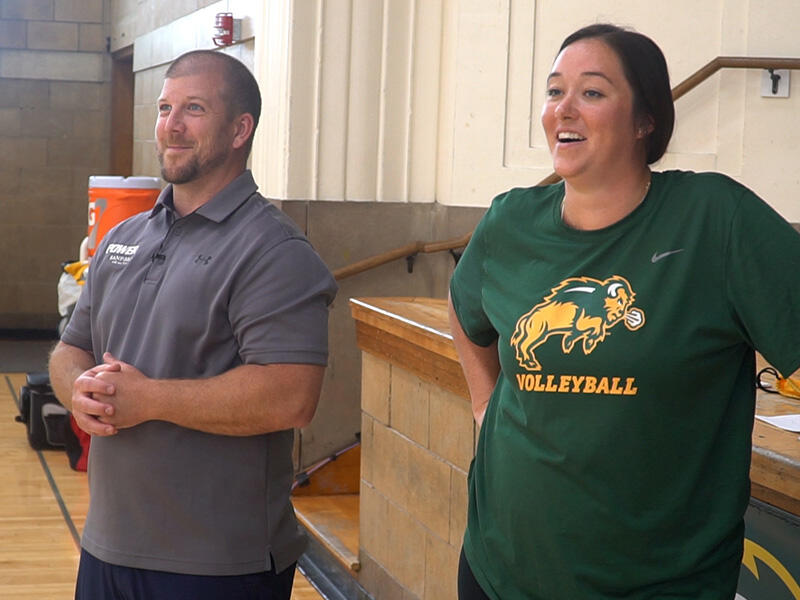The North Dakota State University volleyball team is off to a scorching start. They currently sit atop the Summit League standings, and have set themselves up for a potential conference title.
While hard work and practice have helped the players achieve success on the court, Sanford Health is also assisting the coaching staff in a different way.
Improving physical performance through mental health
Andy Gillham, PhD, CMPC, is the lead performance psychology specialist at Sanford Sports, and he works with Bison coach Jennifer Lopez on getting better mentally instead of physically.
“When you think sports psychology, coaches are performers too. If a coach is just losing his or her mind on the sideline, that impacts the athletes. That’s how we talk to people, how we build a team,” said Gillham. “How we set those pieces up makes a big difference in the athletes’ lives, and sometimes coaches maybe aren’t the best at that part.
“They know the Xs and the Os. They’ve got a system, they know what they believe in, they love the sport, and that’s great passion to pass on to the next group of kids. But they may not always know how to do the coaching part as well. So that’s a huge part of my role is to help coaches coach better, which then helps the athletes.”
Lopez agrees, saying that working on the non-volleyball aspects of coaching helps her relate to players better than ever.
“It’s helped me just take a step back and understand how we work with our athletes, how we communicate with our athletes. You know, times have changed too. How are we adapting to what it is that they need?” said Lopez, a former Bison standout player herself. “You kind of get used to one way, but that way doesn’t always work for every kid that you have come through your program. And that’s kind of the special part about this is you get someone that understands it in a much different way than you.”
Coaching the coaches
Gillham has helped sports programs all over the country with similar sports psychology training, whether they are Division I colleges and universities or high school club teams. He says this focus on mental health can be its own version of practice.
“I’d like to say we’re smarter, meaning we pay more attention now,” said Gillham. “I give so much credit to Jen and her staff up here, because she said, ‘I want to be a better coach. How do I do that?’ And that was the beginning of the collaboration. Much like coaches tell athletes all the time, ‘You gotta get better in the offseason. You gotta go train, you gotta get up, you gotta watch film.’ In reality, coaches need to get better too. That’s the part that perhaps is the new thinking.”
For Lopez, the added benefit is that Gillham’s help is not just one session in the offseason. He continues to work with the team throughout the year.
“To have somebody kind of in our corner able to support us and help us, but also challenge us in ways too, I think is honestly really positive. It’s better than just waiting one time out of the year to go to a convention to try to learn. We get this every week. That’s kind of the cool aspect about it,” said Lopez.
For Sanford Health, Gillham’s work continues to show the organization’s commitment to local athletes and coaches, not just physically through Sanford Sports training and rehab, but in all aspects of athlete and coach health.
“The services and opportunities that their staff is able to help within our athletics department is huge. There are so many outside sources that are available to better our athletes, better our coaches, and ultimately we all have the same goal in wanting to be better,” said Lopez. “I think Sanford does a really good job of helping in those areas where we do need them.”
Learn more
- How Sanford supports athletes’ mental health
- Mandan H.S. launches Sanford Sports psychology program
- Sanford Pentagon joins campaign to stop ref abuse
…
Posted In Behavioral Health, Fargo, Sanford Sports, Sports Medicine

